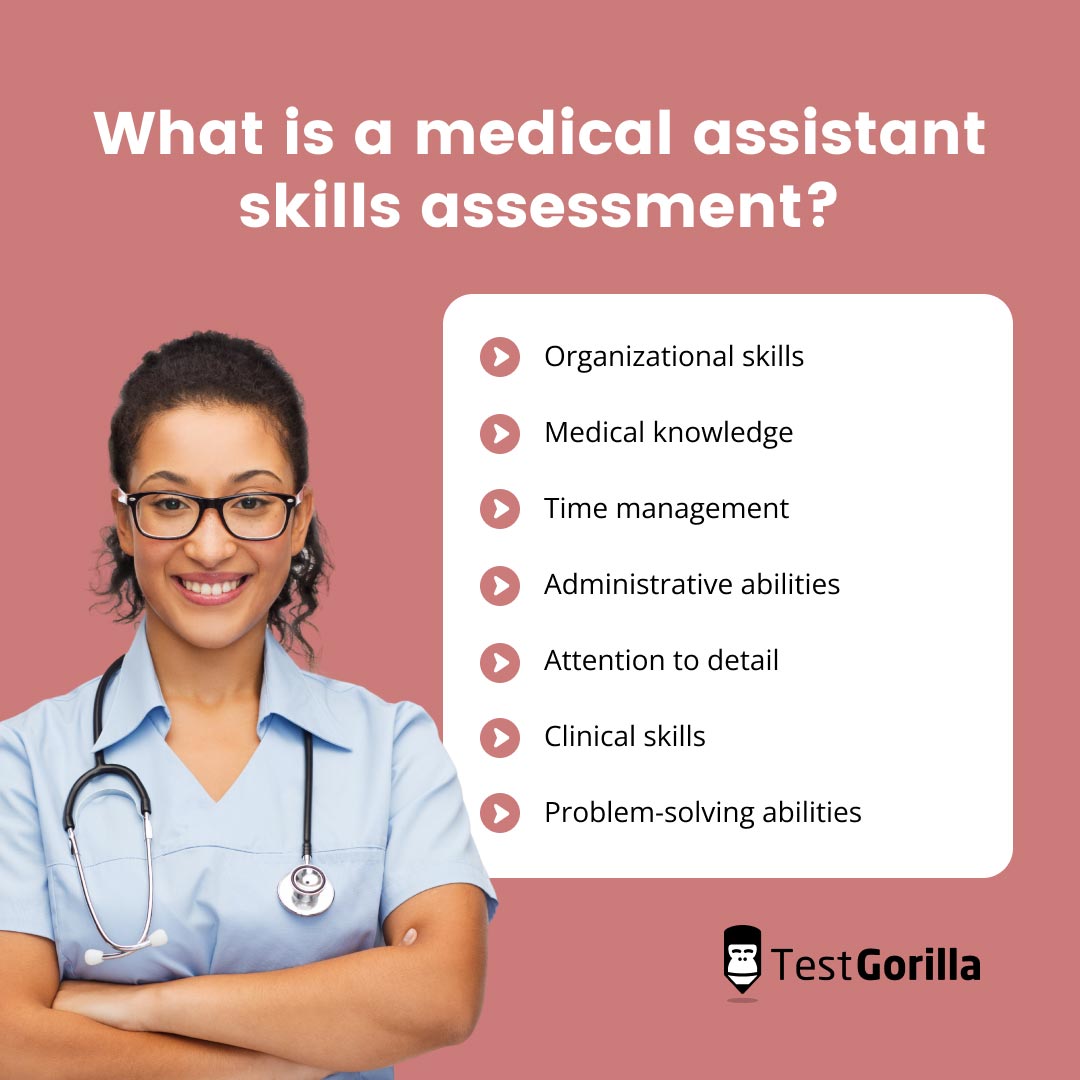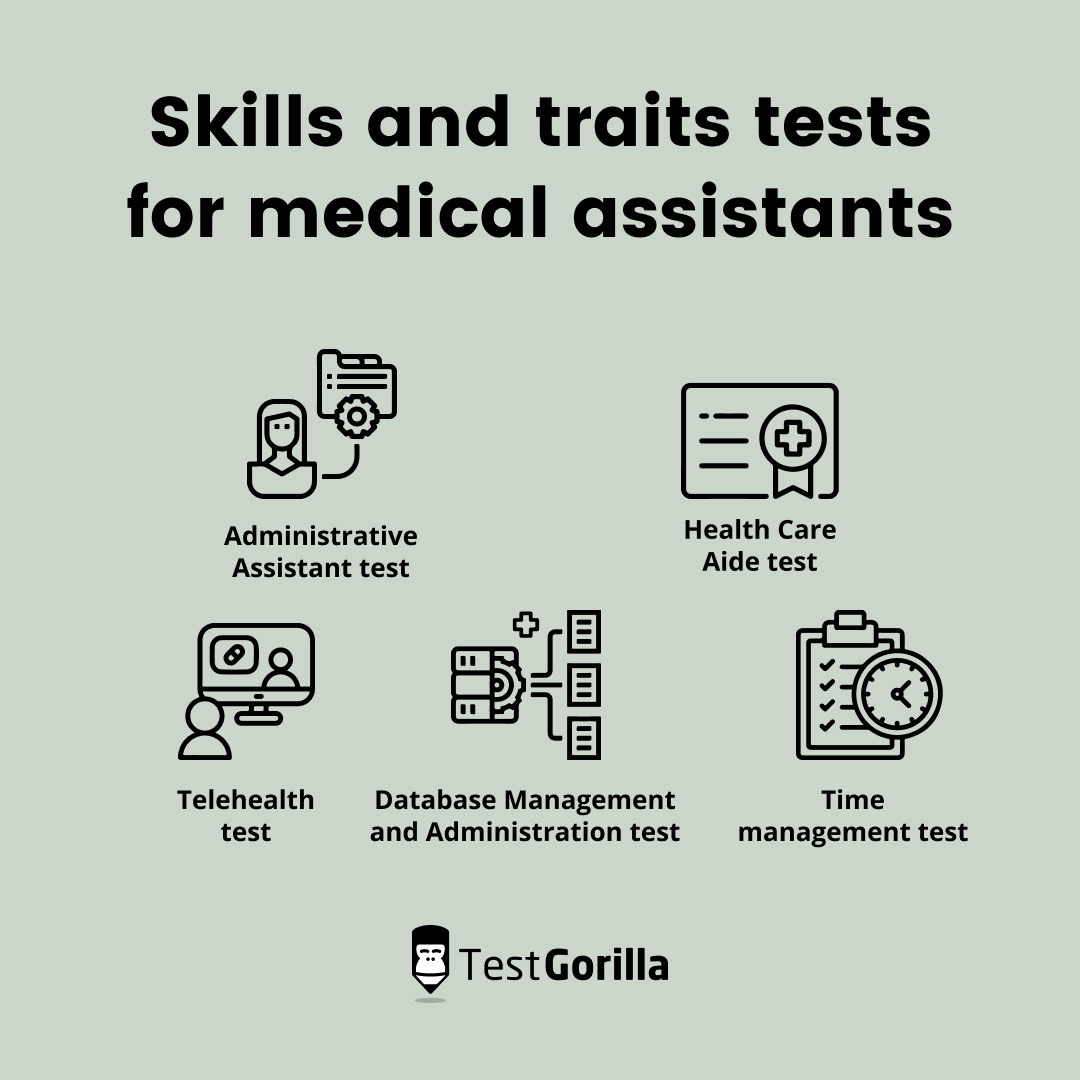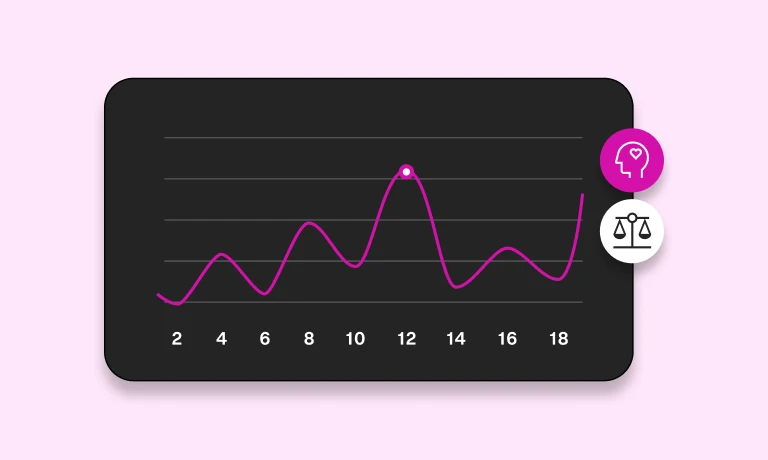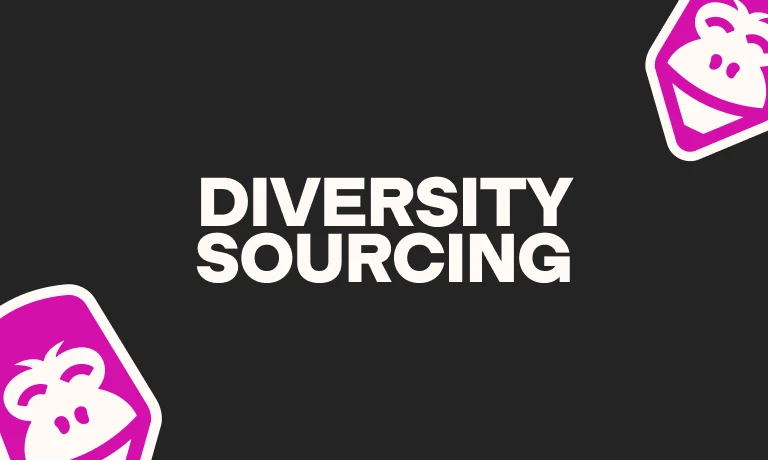How do you want people to feel when they visit your medical facility?
They may find seeing a medical professional daunting, so it’s vital you have a team of friendly, knowledgeable, and thoroughly well-trained staff to make their visit comfortable.
With this expectation in mind, how do you hire a medical assistant with all these qualities?
Your recruitment process should be as thorough as the medical assistant you want to hire, but you’ll likely be under pressure to keep costs and time-to-hire down.
By including a TestGorilla pre-employment assessment in your recruitment process, you can ensure your candidates prove the abilities they list on their resumes.
This guide will explore which skills are needed to be a successful medical assistant, and why you should hire candidates by skills testing with a TestGorilla screening assessment.
Table of contents
- What is a medical assistant skills assessment?
- Why are medical assistant skills important?
- Which skills and traits are important for medical assistants?
- Skills and traits tests for medical assistants
- Medical assistant skills assessment FAQs
- How TestGorilla can help you find skilled medical assistants
- Get started with TestGorilla
What is a medical assistant skills assessment?
A medical assistant skills assessment evaluates the competencies of candidates applying for a medical assistant position. The assessment consists of a collection of relevant, hand-picked tests that allow applicants to demonstrate their industry knowledge and the practical skills required for a medical assistant role.
A medical assistant skills test should evaluate a broad range of traits, abilities, and competencies, covering the hard and soft skills required for the role.
Here are the top skills your medical assistant skills assessment should cover:
Organizational skills
Medical knowledge
Time management
Administrative abilities
Attention to detail
Clinical skills
Problem-solving abilities
As a recruiter, you can use a medical assistant skills assessment during the hiring process to find the best candidates for your open position. Since medical assistants bear a high degree of responsibility in their jobs, you must ensure they have the skills required to work safely and efficiently.
A pre-employment assessment from TestGorilla will screen your candidates for the abilities listed above. With our skills testing platform, you can easily find a competent and skilled medical assistant for your company.
Why are medical assistant skills important?
Medical assistant skills are critical for your facility’s smooth and legitimate operations. A medical assistant needs the right set of skills to ensure your organization achieves optimum efficiency, full confidentiality, and complete compliance with the law.
A medical assistant is responsible for a variety of tasks within your facility, including data management, patient interaction, clinical procedures, and general administration.
Since the position entails a high degree of responsibility, you must ensure your next hire has the right combination of medical assistant skills.
Here are four reasons why medical assistant skills are so important to your facility:
1. Workplace efficiency
Medical assistants provide a much-needed service in clinical settings like the operating room and physicians’ offices. Their time management and organizational skills alleviate pressure from their colleagues and give their workplace a more cohesive structure.
This improves the overall efficiency of workplace operations. Medical assistants with exceptional organizational and administrative skills can boost productivity in the workplace and decrease the time taken to perform certain tasks. This optimizes company operations and boosts patient satisfaction, service success rate, reputation, and overall profitability.
2. Patient confidentiality
All medical practitioners, from office receptionists to executive assistants, must adhere to strict patient confidentiality rules. Strong industry knowledge and organizational skills will help medical assistants comply with legal regulations around confidentiality and allow your organization to operate legitimately.
Medical assistants may breach patient confidentiality rules when they lack the adequate training and the right skill set. This could lead to lengthy legal disputes for your facility, costing you thousands and damaging your reputation. As such, make sure you test any candidates on their industry knowledge before hiring them.
3. Patient satisfaction
The medical industry has to ensure high patient satisfaction rates across the board. The topic of health can be difficult, while seeing a doctor or undergoing surgery can be daunting for many people. As a result, medical assistants need the right skills to facilitate patient satisfaction at every stage of their medical journey.
Interpersonal skills like compassion, emotional intelligence, and patience are key to providing a welcoming environment for patients. Medical assistants who show these traits are more likely to receive praise for their service, which reflects well on your facility. The more in tune a medical assistant is with their patients’ needs, the better feedback your organization will receive, enhancing your reputation and overall performance.
4. Legal compliance
Hospitals and medical facilities must operate according to the strictest codes of conduct. Any breach of the regulations could lead to dire consequences for your company and cause undue suffering for patients and customers.
Medical assistants often work as the binding agent that keeps their facility running effectively and legitimately. They must perform day-to-day admin and ensure they conduct themselves professionally while adhering to strict laws and regulations. In other words, they play a vital role in ensuring the legitimacy and legality of their place of work.
As a result, medical assistants should be well-trained. Testing for medical assistant skills, such as timekeeping, organization, and industry knowledge, will ensure your new hire works effectively and complies with all the relevant regulations. This way, your organization can avoid unnecessary disputes, ramifications, and legal battles.
The best insights on HR and recruitment, delivered to your inbox.
Biweekly updates. No spam. Unsubscribe any time.
Which skills and traits are important for medical assistants?
The day-to-day duties of a medical assistant are varied and can involve anything from simple admin to helping with medical procedures. This means that medical assistants need a range of skills and traits to ensure they can carry out their responsibilities in the most effective and legally compliant manner.
With that in mind, here are the key skills and traits a successful medical assistant should possess:
Medical knowledge
While medical assistants aren’t the primary or only practitioner who administers treatment, they are expected to help with medical procedures when required. This may involve recommending treatment, giving medical advice, performing vaccinations, supporting senior practitioners, inserting cannulas, and interpreting medical data.
These duties all require a high degree of medical knowledge and clinical skills. As a result, you need to hire a medical assistant who demonstrates applied abilities in these areas and has a good grasp of general industry knowledge.
Administrative skills
A large part of a medical assistant’s duties might involve administrative tasks. They may regularly handle data and manage spreadsheets and databases of patient details, appointment information, and medical records. As a result, medical assistants need adept administrative skills to work efficiently.
Other common administrative duties involve greeting patients, scheduling appointments, managing insurance forms, and providing customer service. This means that medical assistants need strong organizational skills, time management abilities, and other administrative competencies such as computer literacy and attention to detail.
Communication
On a typical shift, a medical assistant will be required to communicate with a diverse range of patients, customers, colleagues, and senior figures. Since interactions vary in formality and expertise, skilled medical assistants must be able to communicate clearly and appropriately using different registers.
For example, a medical assistant may need to explain an upcoming procedure to a patient. In this case, they must communicate using words the patient is familiar with and avoid technical jargon. Conversely, a medical assistant may also be required to use medical terms when interacting with colleagues to convey the correct information.
Written communication skills are also beneficial for medical assistants. For instance, knowing how to write clear and concise emails will speed up any bureaucracy and streamline record-keeping processes.
Emotional intelligence
Emotional intelligence is the ability to identify, understand, and manage your emotions and those of others around you. The importance of emotional intelligence for medical assistants cannot be overstated, because they must frequently deal with stressful situations and interact with a wide variety of people.
Medical assistants must be patient, friendly, and in tune with those around them. They must also recognize and manage their own anxieties and direct their actions accordingly. As a result, emotional intelligence is a valued trait for a medical assistant to possess.
Skills and traits tests for medical assistants
The future of recruitment is skills-based. Traditional recruitment through resumes does not accurately assess whether candidates possess the skills that match their employment history. Companies frequently hire candidates based on reported experience alone rather than gauging their applied abilities before offering them a position.
The best way to source applicants with the right skill set is to use pre-employment assessments in your hiring process. This way, you can see which candidates possess the qualities needed to succeed at your organization.
Here are some recommended tests you can use to evaluate the skills of prospective medical assistants in your TestGorilla pre-employment assessment:
Administrative Assistant test
Medical assistants perform a wide range of administrative tasks in their daily duties. As a result, you should ensure your candidates are tested on their abilities to handle general admin before you recruit them to your company.
Our Administrative Assistant test is an all-encompassing test that evaluates the key traits and skills required to complete administrative tasks to a high standard successfully. Candidates are tested on the following abilities:
Managing admin
Problem solving
Attention to detail
Verbal and written communication
Organization
Time management
Use our Administrative Assistant test to hire competent medical assistants for your business. This test will help you identify the most organized and capable candidates who can keep your company running efficiently, support patients and staff, and improve your overall service delivery.
Health Care Aide test
The Health Care Aide test analyzes candidates’ skills relating to healthcare, assisting patients, and medical knowledge. This test evaluates a combination of transferable soft skills and industry-specific hard skills, allowing you to view the applicants with the best blend of interpersonal competencies and medical expertise.
It also assesses patient care techniques, first aid skills, patient interaction abilities, and other soft skills in healthcare. You can use this test to hire qualified medical assistants who demonstrate a thorough knowledge of medical practices and a high degree of empathy and emotional intelligence.
Candidates who score highly on this test will likely become assets to your organization. Medical assistants with strong interpersonal skills backed up by industry expertise can bolster your company’s reputation as a friendly, professional facility.
Telehealth test
As of 2023, 40.9% of workers have a fully remote or hybrid schedule. This figure has risen since the pandemic, including in the health sector. Thanks to improved technology, not every patient is required to visit their doctor in person. This means that medical assistants may be responsible for calling patients, assessing their needs over the phone, and recommending an appropriate course of action.
Our Telehealth test evaluates candidates' ability to utilize technology and provide effective remote medical support. The test covers telehealth protocols, patient engagement techniques, communication skills, patient monitoring, and data collection.
High-performing candidates will demonstrate competencies in the hard and soft skills required to be a successful medical assistant. This test is particularly relevant if your facility operates a remote service, such as triage appointments or over-the-phone prescriptions.
Database Management and Administration test
Medical assistants are often required to handle data in their daily duties. This could involve inputting appointment details, creating spreadsheets, and overseeing patient databases. As a result, qualified medical assistants must demonstrate capable database management and computing abilities.
Use our Database Management and Administration test to evaluate candidates’ knowledge of databases and their data administration competencies. This timed assessment will cover creating, using, and optimizing databases, database security, and data integrity. Ultimately, you can see which candidates rank highest in database management and computing skills.
Time management test
Medical assistants need exceptional organizational skills. They typically perform various administrative tasks in any given week, such as scheduling appointments, inputting patient data, and cooperating with other staff members. Medical assistants must have good time management skills to balance their tasks and fulfill their responsibilities efficiently.
TestGorilla’s Time management test covers the fundamentals of organization. Candidates are assessed on their abilities to prioritize, plan, communicate, and execute tasks within a certain time limit. Participants are given real-life workplace scenarios and asked to find the best solution to the problem. Top performers will exhibit the organizational skills worthy of a medical assistant position.
Medical assistant skills assessment FAQs
Recruiting a medical assistant can be tough, particularly if you’re unsure how to assess the right skills. Read the following frequently asked questions for more information on hiring the best candidates for your medical assistant positions:
What does a medical assistant do?
Medical assistants take on a range of responsibilities in their role, from inputting patient data to performing minor medical procedures. They help run medical facilities like hospitals and doctors’ offices by handling a variety of administrative and clinical tasks. The exact duties of a medical assistant will depend on the type and size of the facility.
Which skills are most desirable in a medical assistant?
A good medical assistant needs a blend of industry knowledge and interpersonal skills to perform their duties effectively. The most sought-after skills in a medical assistant include clinical abilities, medical expertise, communication, compassion, organization, timekeeping, stress management, accountability, attention to detail, and computer skills.
Which soft skills should you look for in a medical assistant?
While specialist knowledge and practical skills are essential, a medical assistant must also possess soft skills. Problem-solving, organization, empathy, and teamwork are four key soft skills that define a medical assistant’s practice. Strong candidates for medical assistant positions will demonstrate experience and aptitude in these areas.
How TestGorilla can help you find skilled medical assistants
Medical assistants need a blend of hard and soft skills to succeed at your facility. As such, you must find a candidate with a combination of thorough industry knowledge and strong interpersonal skills if you want to hire the right person on the first occasion.
TestGorilla can make your recruitment process easier and faster without compromising its integrity. Our pre-employment assessments provide clear feedback about your candidates’ relevant skills and how they rank among each other. From there, you can simply offer the top performers an interview.
This process prevents weaker candidates from slipping through to the interview stage and eliminates unconscious bias in your hiring process. Choose up to five of the skills tests listed above to create your pre-employment assessment to hire skilled medical assistants for your organization.
Get started with TestGorilla
To hire the best medical assistants, your recruitment process must be thorough. But this doesn’t mean it has to be lengthy or difficult. Instead of judging candidates from resumes alone, invite them to take a TestGorilla pre-employment assessment and let them demonstrate their skills in practice. This way you can avoid hiring a candidate who looks good on paper, but does not actually possess the skills to perform well in the role.
Our research-backed tests are designed by industry experts to uncover your applicants’ true abilities. Pick and choose the tests (up to five) you’d like to include in your assessment, and customize your assessment further with up to 20 custom questions. Once your candidate pool has taken your assessment, invite your top performers to an interview and politely decline the rest.
You’ll find your hiring process becomes quicker, easier, and much more thorough. Take advantage of your free TestGorilla plan today to hire a top medical assistant for your organization.
You've scrolled this far
Why not try TestGorilla for free, and see what happens when you put skills first.




















